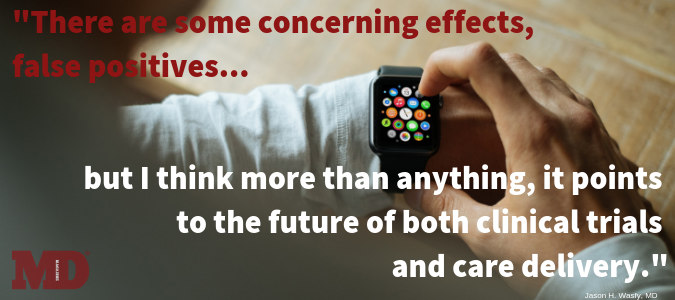Article
Apple Heart Study Met with Praise, Skepticism
Author(s):
The Apple Heart Study examined more than 400,000 patients over the course of a year, but some experts were less than thrilled with the outcomes.

Last week—for better or worse—the Apple Heart Study captured the attention of those outside of the cardiology community following its presentation at the American College of Cardiology (ACC) 2019 Annual Scientific Session.
The Study
While the trial has been making headlines for its impressive study size and implications for the advancement telehealth, experts in the field remain skeptical about what the study mean immediately for remotely diagnosing, treating atrial fibrillation (AF) in patients.The study examined 419,297 people with an Apple Watch and compatible iPhone. The participants, who were required to have not been previously diagnosed with AF nor have taken anticoagulant therapy, downloaded the Heart Study app. The app sent users a notification if it detected 5 of 6 repeat tachograms of an irregular pulse within a 48-hour period. The study sought to measure the proportion of participants with an irregular pulse watch notification (IPWN) who have AF on subsequent electrocardiogram (ECG), to characterize the concordance of the IPWN algorithm to simultaneously-recorded ambulatory ECG, and to measure the rate of initial contact with a health care provider within 3 months of the IPWN.
A notification was received by 2161 participants (.52%). Of that group, patches ECG patches were sent to 658 participants; 450 were returned and included in the analysis. AF was identified in 34% of those who received a notification and wore the patch. Notification rates were most common in participants over the age of 65 and were lowest among those under 40.
The positive predictive value for the tachogram was 71% and was 84% for the notification. Investigators found that about half of the participants who received a notification sought the attention of a study doctor. Additionally, 57% of participants who received an alert sought medical care outside of the study. Investigators emphasized the value of finding and presenting baseline reports of accuracy for a werable device that could eventually play a bigger role in public health.
The Reaction
“[Overall], this study improves our understanding of how this wearable technology and app works in the real-world setting and how well the technology can detect long periods of AFib,” said Mintu Turakhia, MD, associate professor of cardiovascular medicine, Stanford School of Medicine, and the study’s co-principal investigator, in a statement. Physicians, including Peter Toth, MD, PhD, director of preventive cardiology at CGH Medical Center and clinical professor at the University of Illinois, expressed enthusiam about the results, and what the field "can make of it."
“We need long-term studies to determine if it does make a difference," Toth told MD Magazine®. "This whole field is in its infancy, but it’s evolving rapidly."
Jason H. Wasfy, MD, medical director of the Massachusetts General Physicians Organization, echoed optimism for the study's potential, highlighting the shee size of the study's data.
"There are some concerning effects, false positives and so forth and so on, but I think more than anything it points to the future of both clinical trials and care delivery," Wasfy explained. "That we have tools now that are, at least potentially, far more efficacious than traditional care delivery tools."
While some cardiologists commended the study, others took issues with certain aspects of the study and its results. Venkatesh Murthy, MD, associate professor of cardiovascular medicine at the University of Michigan Medical School, was one of many who took to Twitter to express his thoughts, pointing out on a thread apparent issues with the study’s diagnostic accuracy and the overall cost of conducting the trial.
I'm going to wait until about 200+ votes before proceeding. This is an important tweetorial. Please build up interest by retweeting the first tweet in this thread.
Depending on time/interest, we will cover:
1. Diagnostic accuracy
2. Bias
3. Costs of trials
— Venk Murthy (@venkmurthy) March 16, 2019
Murthy told MD Mag he believes this type of technology will have a role in medicine, but that people should “temper the enthusiasm” until there is better data.
“I believe we need a randomized trial which shows that receiving this type of information leads to improvements in rate of stroke, death, myocardial infarction and other important health outcomes. To date, we don’t even know if this device leads to better peace of mind among its users, let alone whether it saves lives,” Murthy said.
Paul Friedman, MD, profesor of medicine and chair of the department of cardiovascular medicine at the Mayo Clinic, joined Murthy in taking to Twitter to express his concerns with the study.
1. The Apple Watch Study presented at #acc19 is a remarkable feasibility study -- over 400,000 people participated in just over a year...BUT....
— Paul Friedman, MD (@drpaulfriedman) March 17, 2019
“The present study was important for showing how to enroll many people and gather some clinical information—but doesn't inform practice,” Friedman explained in a series of tweets. “Rather—it lays the groundwork for how to conduct the studies that will answer the question of what to do if your watch sees AF.”
Whether optimistic or cautious, physicians could still agree this was far from the last iteration of the Apple Heart study data.
"It’s not a finished product, but what is a finished product?" Toth said. "They will find many, many applications for this, I’m sure of that."





